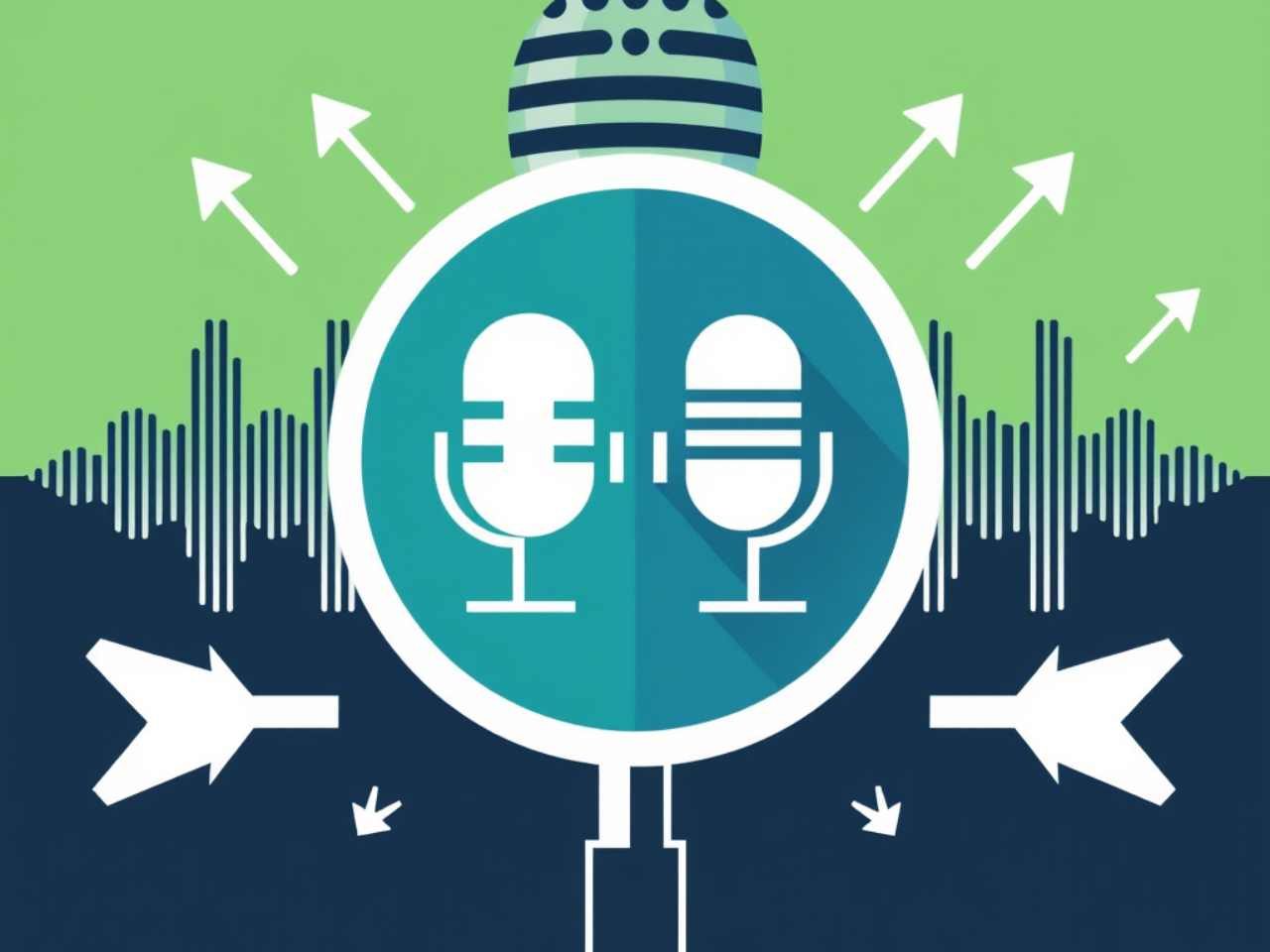Introduction to Podcast Collaboration Strategies
Podcast collaboration is when two or more podcast creators work together to create or promote content. This could be as simple as appearing on each other’s shows or working on a joint episode. Collaboration is a powerful way to grow your podcast and reach new listeners.
By collaborating with other podcasters, you can tap into new audiences, build credibility, and create engaging content. These strategies are especially helpful if you’re trying to grow your podcast or reach new listeners. Understanding podcast collaboration strategies can help you expand your reach while creating better content.

Benefits of Collaborating in the Podcast World
1. Expands Your Audience Reach
When you collaborate with another podcast, you get access to their listeners. This means people who may not have heard of you before can now discover your show. It’s a great way to grow your audience quickly.
For example, if you have a tech podcast and you collaborate with another tech or business podcast, their audience is likely interested in your content too. This kind of cross-promotion helps both podcasters grow by sharing their listener base.
2. Boosts Listener Engagement
Collaborating can make your episodes more engaging. When you have a guest or co-host, it adds new energy to the conversation. Listeners enjoy hearing different perspectives and voices.
Collaboration also allows for fresh topics, which keeps your content exciting. You can cover topics you wouldn’t normally tackle by bringing in experts or different podcasters. This creates more value for your audience and keeps them coming back for more.
3. Increases Credibility and Authority
Working with other established podcasters can boost your credibility. If your listeners see you collaborating with well-known figures or experts in your field, it raises your reputation. It shows you’re connected in the industry and respected by your peers.
This also works the other way. When you invite credible guests onto your show, your authority increases in the eyes of your audience. By aligning with others in your space, you position yourself as a leader, which can help you gain more loyal listeners.
4. Open Doors for New Opportunities
Collaboration is not just about growing your podcast—it opens up new doors. You may get offers to appear on other podcasts, speak at events, or even create new projects together.
Partnering with others can lead to sponsorships or brand deals, as businesses prefer podcasters with wide networks. The more you collaborate, the more opportunities you’ll attract, whether it’s growing your podcast or even creating new ventures in the future.
Types of Podcast Collaboration You Can Leverage
There are many ways to collaborate with other podcasters. Each type has its own benefits, and you can choose the one that fits your goals. Let’s explore some podcast collaboration strategies that can help you grow your audience and create better content.
1. Find and Feature Guest Hosts Effectively

Inviting a guest host to your podcast is a great way to add variety and fresh ideas. It also gives your audience a break from hearing just your voice. To find the right guest host, look for someone who shares a similar audience or niche. They should complement your podcast but also bring their own perspective.
When featuring a guest host, make sure to promote their appearance in advance. Share details on your social media and with your audience. This not only boosts your show but also attracts their followers. Make the guest feel welcome by preparing topics and guiding the conversation to flow naturally.
2. Cross-Promote with Other Podcasts for Mutual Growth
Cross-promotion is when two podcasts agree to promote each other. This is a win-win because it helps both shows grow by introducing them to new audiences. To cross-promote effectively, find podcasts that target similar listeners. For example, if you have a fitness podcast, you can partner with a nutrition podcast.
Once you’ve agreed to cross-promote, you can mention each other’s podcasts at the beginning or end of episodes. You can also swap ad spots, so their listeners hear about your show, and vice versa. This simple strategy helps both podcasts grow without any major effort.
3. Partner with Another Creator for Long-Term Success (Co-hosting)
Co-hosting a podcast is a big commitment, but it can pay off in the long run. Partnering with another creator allows you to share the workload and bring more ideas to the table. This can lead to richer discussions and more engaging episodes.
To make co-hosting work, find someone who shares your vision and is reliable. Consistency is key, so both of you need to be on the same page about schedules and content. Together, you can create a podcast that reaches a wider audience and offers diverse content.
4. Interview Swaps: Exchanging Interview Slots for Greater Exposure
An interview swap is when you appear on another podcaster’s show, and they appear on yours. This is a simple yet powerful way to gain exposure. When you feature another podcaster, their audience will likely check out your show, and when you appear on their podcast, your listeners might do the same for them.
To set up an interview swap, reach out to podcasters in your niche. Offer to have them on your show and suggest you appear on theirs in return. This mutual exposure can help you both build your audience and make valuable connections in your industry.
5. Collaborate Episodes to Double the Audience
Collaborative episodes involve working with another podcaster to create a joint episode. This can be a fun and creative way to combine your strengths and attract both audiences. For example, if you have a true crime podcast and your partner has a psychology podcast, you can work together to discuss a crime from both perspectives.
When planning a joint episode, decide on a topic that interests both your audiences. Promote the episode heavily across both podcasts and social media to maximize exposure. By sharing the episode with both sets of listeners, you can double your reach with one piece of content.
These podcast collaboration strategies are easy to implement and can offer big rewards. Whether you’re just starting out or looking to grow, collaborations can help you reach new heights.
How to Identify the Right Podcast for Collaboration
Finding the right podcast to collaborate with is key to successful podcast collaboration strategies. You want to make sure that the podcast you choose aligns with your goals and audience. Let’s look at how you can identify the right partner.
1. Find Podcasts That Match Your Audience Demographics
To make the most of a collaboration, it’s important that your audiences have something in common. Look for podcasts that share similar audience demographics, like age, interests, or listening habits. For example, if your podcast targets young entrepreneurs, you’ll want to partner with another podcast that also speaks to this group.
You can identify audience overlap by listening to potential podcasts and reading their show descriptions. Look for topics that would naturally attract the same types of listeners. If your audiences align, the collaboration will feel more seamless and beneficial for both parties.
2. There Should be Content Relevance of Chosen Podcast
The content of the podcast you collaborate with should also match your own. When the themes are similar, it’s easier to create content that makes sense for both sets of listeners. For example, a podcast about mental health could collaborate well with a podcast focused on personal development.
By aligning on content, both podcasts benefit from increased listener interest and engagement. Choose podcasts that cover similar, complementary topics to ensure a smooth collaboration that benefits everyone.
You Might Like To Read: How to Make a Podcast Interesting: 10 Secret Tips No One Will Tell You!
3. Size and Influence: Should You Collaborate with Bigger or Smaller Shows?
When deciding whether to work with a bigger or smaller podcast, think about your goals. Collaborating with a bigger podcast can give you a wider reach, but it might be harder to secure. Smaller podcasts, on the other hand, might be more willing to work with you and offer more direct engagement with listeners.
It’s important to balance size and influence. Don’t always aim for the biggest podcast—sometimes smaller shows with highly engaged listeners can offer more value. Look for podcasts that are actively growing and have a loyal following, even if they’re not massive.
4. Tools and Platforms to Discover Ideal Podcast Partners
There are plenty of tools and platforms that can help you find the right podcast for collaboration. Websites like Podchaser, Listen Notes, and Apple Podcasts allow you to search for shows by category, listener reviews, and more.
You can also use social media platforms like Twitter and Instagram to find podcast creators who share similar interests. Join podcasting groups or communities to network and discover potential collaborators. Doing your research will help you choose the best partners for your collaboration.
How to Pitch Like a Pro & Approach Potential Collaborators
Once you’ve found the right podcast, the next step is reaching out to them. How you approach potential collaborators can make or break the deal. Let’s go over some podcast collaboration strategies for crafting a successful pitch.
1. Craft a Persuasive Pitch Email
Your pitch email should be short, clear, and to the point. Start by introducing yourself and your podcast, explaining what makes your show unique. Then, talk about why you’re interested in collaborating and how it will benefit both parties.
For example, you could say something like, “I think our podcasts have similar audiences, and collaborating could help us both grow.” Be polite and professional, and make it easy for them to see the value in working with you.
2. Highlight Mutual Benefits for a Win-Win Situation
When pitching, focus on the mutual benefits. Explain how the collaboration can help their podcast as well as yours. Maybe you have access to an audience they want to reach, or you offer expertise in an area that interests their listeners. By highlighting how the collaboration is a win-win, you increase your chances of getting a positive response.
Make sure you personalize your pitch for each podcast. Mention specific episodes or topics you enjoyed, so they know you’ve done your research. This will show that you’re serious about working together and not just sending out mass emails.
3. Follow Up Without Being Pushy
If you don’t hear back after your first pitch, it’s okay to follow up. Wait a week or two, then send a polite reminder. Keep the message brief and friendly, like, “Just wanted to check if you had a chance to consider my collaboration idea.”
Avoid being pushy or sending too many follow-ups. If they’re not interested, respect their decision and move on. Being patient and professional will help you build good relationships in the podcasting community, even if a collaboration doesn’t work out right away.
How to Plan and Execute Successful Collaborative Episodes
Collaborating on a podcast episode can be fun and rewarding, but it requires careful planning. Let’s break down some simple steps to ensure your collaboration goes smoothly and benefits both sides.
1. Ensure Smooth Collaboration by Scheduling
The first step to a successful collaboration is scheduling. You’ll need to find a time that works for both you and your collaborator. This can be tricky, especially if you’re in different time zones. Use tools like Google Calendar or scheduling apps to make it easier. Be flexible and plan ahead to avoid any last-minute changes or delays.
2. Structure the Episode to Benefit Both Parties
Once you’ve got the schedule sorted, it’s time to plan the content. You want to make sure the episode is valuable to both of your audiences. Work together to decide on a topic that fits both podcasts. Outline the key points and decide who will lead different parts of the conversation. A well-structured episode ensures that everyone’s voice is heard and both shows benefit.
3. Promote the Collaboration to Maximize the Exposure
Promotion is key to making sure your collaboration gets noticed. Start promoting the episode before it goes live. Tease it on social media, share clips, or mention it in previous episodes. After the episode airs, continue promoting it to keep up the momentum. Encourage your listeners to check out your collaborator’s podcast as well, and ask them to do the same for you. This can help grow both audiences.
4. Post-Collaboration Analysis: Measuring Success and Future Potential
After the collaboration, take some time to analyze how it went. Look at listener numbers, engagement, and any feedback you received. Did the episode attract new listeners? Did both podcasts benefit? This analysis helps you understand what worked and what didn’t, so you can improve in the future. If the collaboration was a hit, you might even plan more joint episodes down the line.
Cross-Promotional Strategies to Maximize Collaboration Success
To get the most out of your podcast collaboration, cross-promotion is essential. Here are some easy strategies to help you maximize the success of your collaboration.
1. Use Multiple Social Media Platforms to Announce Collaborations

Social media is a powerful tool for promoting your collaboration. Share the episode on all of your platforms, including Twitter, Instagram, Facebook, and LinkedIn. Tag your collaborator in your posts and use relevant hashtags to reach a wider audience. The more platforms you use, the more exposure you’ll get.
2. Leveraging Mailing Lists: Alert Your Subscribers of Collaborative Content
If you have an email list, don’t forget to use it. Send out an email to your subscribers letting them know about the upcoming collaboration. Explain why it’s exciting and why they should listen. This is a direct way to inform your most loyal listeners about new content, ensuring they don’t miss out.
3. Joint Marketing Campaigns: Work with Partners to Create Buzz
Working together with your podcast partner on a joint marketing campaign can generate more buzz than promoting alone. Coordinate with your collaborator to create promotional content, like graphics or teaser videos, that both of you can share. By pooling your resources and audiences, you can create more excitement and draw in more listeners.
4. Call-to-Actions: Encourage Audience to Follow or Subscribe Across Both Shows
During the collaborative episode, be sure to include clear call-to-actions (CTAs). Encourage listeners to follow or subscribe to both podcasts. A simple reminder at the end of the episode can be very effective in converting casual listeners into subscribers. You can also ask your collaborator to do the same for your show. This ensures that both podcasts benefit from the collaboration.
How to Avoid Common Pitfalls in Podcast Collaborations
Collaborating on a podcast can be rewarding, but there are common mistakes that many people make. Let’s go over some of these pitfalls and how to avoid them.
1. Misaligned Goals and Expectations: Set Clear Boundaries from the Start
One big mistake is not setting clear goals or expectations. If you and your partner don’t agree on what success looks like, it can lead to frustration. Before starting, sit down and talk about what you both want from the collaboration. Agree on who will do what, what the episode should achieve, and how you’ll promote it. Setting clear boundaries from the start makes things smoother later on.
2. Audience Mismatch: Don’t Collaborate with the Wrong Podcasts
Another common issue is collaborating with a podcast that doesn’t match your audience. If your podcast talks about technology and your partner’s podcast is about fashion, your listeners might not be interested in their content, and vice versa. When choosing a collaboration partner, make sure your audiences are similar. This way, both podcasts can grow together.
3. Scheduling Conflicts: The Importance of Timely Communication
Scheduling can easily become a headache if communication isn’t clear. If you don’t stay in touch about when and where to record, things can get delayed or fall apart. Always keep your partner in the loop and be open about any changes in availability. Good communication can prevent scheduling conflicts and keep everything on track.
4. Over-Promising and Under-Delivering
It’s easy to get excited and promise more than you can deliver. But if you don’t follow through, it hurts the collaboration and can damage your reputation. Be realistic about what you can commit to and stick to it. If you promise to promote the episode or handle certain tasks, make sure you do them. It’s better to under-promise and over-deliver.
How to Sustain Long-Term Podcast Partnerships
Building a long-term collaboration can bring huge benefits, but it requires effort. Let’s look at how you can maintain these partnerships over time.
1. Build Trust and Reliability with Your Collaboration Partners
Trust is key in any long-term relationship, including podcast collaborations. Make sure you always meet deadlines and stay professional. If your partner knows they can rely on you, they’ll be more likely to collaborate with you again in the future. Show them that you value their time and effort, and you’ll build a strong foundation for future projects.
2. Recurring Collaborations: How to Keep the Relationship Going Over Time
Once you’ve had a successful collaboration, don’t let it be a one-time thing. Reach out to your partner after the episode airs to see how they felt about it. If it went well, suggest future projects or ways you can collaborate again. Recurring collaborations help grow both podcasts over time and strengthen your relationship.
3. Networking Tips: Expand Your Collaboration Network After Initial Success

Once you’ve successfully collaborated with one podcast, you can use that as a stepping stone to connect with others. Ask your collaboration partner if they know any other podcasters who might be interested in working with you. Keep attending podcasting events or joining online communities to meet more creators. Expanding your network helps you find new opportunities and keeps your podcast growing.
You Might Like To Read: Insider Tips for How to Create a Podcast Network That Takes the Industry by Storm
Leverage Analytics to Improve Your Podcast Collaboration Strategies
Using analytics to track the performance of your podcast collaborations is key to improving your strategy. Let’s explore how you can leverage data to ensure that your podcast collaborations are successful.
1. Track Collaboration Impact: How to Measure Listener Growth and Engagement
After you collaborate, it’s important to know if it made a difference. Did you gain new listeners? Are people more engaged with your content? To measure this, check your podcast’s downloads, listens, and subscriptions before and after the collaboration. Look for spikes in engagement, such as more listener comments or shares. By tracking these metrics, you can see if the collaboration helped grow your audience and keep them engaged.
2. Use Listener Feedback to Refine Future Collaborations
Your listeners are your best source of feedback. After the collaboration, ask your audience what they thought about the episode. Did they like the guest host or the content? What would they like to hear next time? Use this feedback to refine your future collaborations. The more you understand what your listeners enjoy, the better your future partnerships will be.
3. Analytics Tools: Best Platforms to Track Collaborative Success
There are several tools available to track your podcast’s analytics. Platforms like Spotify for Podcasters, Apple Podcasts Connect, and Podbean provide data on listener demographics, episode performance, and engagement. These platforms help you track the success of your collaborations and give insights into what’s working. Use these tools to make data-driven decisions for future collaborations.
Case Studies: Successful Podcast Collaborations
Looking at successful podcast collaborations can give you great insights into what works. For example, “The Daily” from The New York Times frequently partners with news experts to boost credibility and audience engagement. Another example is “Crime Junkie”, which collaborates with other true-crime podcasters to expand their audience reach. These case studies show that with the right partner, you can grow your listener base and strengthen your content.
Conclusion: Master Podcast Collaboration for Long-Term Success
Podcast collaboration is a powerful way to grow your audience, improve content quality, and create lasting partnerships. By setting clear goals, choosing the right partners, and tracking results through analytics, you can refine your strategy for long-term success. Avoid common mistakes, stay flexible, and always listen to your audience. With the right approach, podcast collaboration will help take your show to the next level.
Image Credit: AI & Freepik